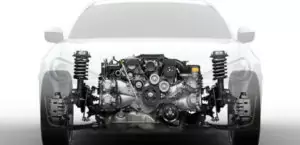The 2.5-liter Volkswagen CBTA gasoline engine was produced from 2008 to 2014 and was installed on the popular Golf, Jetta, Beetle, Passat models for the American market. This power unit had several analogues with completely different CBUA and CCCA indices.
The EA855 series includes: BGP, CBTA, CEPA, CTSA, DAZA, DNWA.
Specifications
| Production years | 2008-2014 |
| Displacement, cc | 2480 |
| Fuel system | injector |
| Power output, hp | 170 |
| Torque output, Nm | 240 |
| Cylinder block | cast iron R5 |
| Block head | aluminum 20v |
| Cylinder bore, mm | 82.5 |
| Piston stroke, mm | 92.8 |
| Compression ratio | 10.3 |
| Features | no |
| Hydraulic lifters | yes |
| Timing drive | chain |
| Phase regulator | on the intake shaft |
| Turbocharging | no |
| Recommended engine oil | 5W-30 |
| Engine oil capacity, liter | 6.0 |
| Fuel type | petrol |
| Euro standards | EURO 5 |
| Fuel consumption, L/100 km (for VW Passat 2012) — city — highway — combined |
17.1 8.6 11.7 |
| Engine lifespan, km | ~350 000 |
The engine was installed on:
- Volkswagen Beetle 2 (5C) in 2011 – 2014;
- Volkswagen Golf 6 (5K) in 2009 – 2014;
- Volkswagen Jetta 5 (1K) in 2008 – 2010; Jetta 6 (1B) in 2010 – 2014;
- Volkswagen Passat NMS (A32) in 2011 – 2014.
Disadvantages of the VW CBTA engine
- This power unit is very reliable, the owners complain only about fuel consumption;
- In case of severe traction failures, start the search for the culprits with the fuel pump or its filter;
- Not the highest resource is the water pump, as well as ignition coils;
- In electrical terms, the most common concern is the coolant temperature sensor;
- On runs over 200 thousand km, it may be necessary to replace the timing chain with tensioners.






